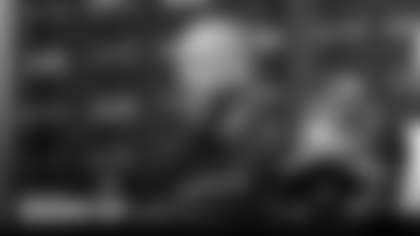CHICAGO—The last time the Seahawks played at Soldier Field, they were a 6-5 team clinging to playoff hopes, facing a tough Bears squad, led by a star-studded defense, also chasing a playoff berth.
Up to that point, the Seahawks were just 1-5 on the road, including a loss at Miami a week earlier, adding to the old narrative that the Seahawks couldn't play well when traveling east. Week 13 saw the Seahawks playing at Chicago in the dreaded 10 a.m. PT time slot, going against the 8-3 Bears, whose defense would finish the season ranked first in takeaways, third in points allowed and fifth in total defense. For the Seahawks, one more loss might have been enough to end their playoff hopes.
And when Bears punter Adam Podlesh pinned the Seahawks at their own 3-yard line down by four points with only 3:16 left on the clock, things looked bleak for Seattle. What happened next, however, didn't just help build up the legend of rookie quarterback Russell Wilson, it helped give a young team confidence heading into a stretch run in which the Seahawks would enjoy one of their most dominant stretches of games in franchise history, setting the table for a Super Bowl winning season a year later.
With the Seahawks back in Chicago for the first time since that memorable game, we take a look back at their 2012 victory though the eyes of people involved in the game six years ago.
Brandon Marshall, an All-Pro receiver for the 2012 Bears: "Going into that game, I just thought, there is no way this kid (Wilson) was going to come in and beat us. With Lance Briggs, Peanut (Charles) Tillman, Julius Peppers, Brian Urlacher, Tim Jennings, Izzy (Israel Idonije), I was like, there is no way this guy is going to come in here and do anything versus this defense. Our defense was doing record-breaking things every single game and he came in and destroyed us, so that was deflating a little bit."
Going 97 yards in three minutes is no easy task for any offense, let alone a young one led by a rookie quarterback while playing in hostile environment. But when Wilson got in the huddle with the Seahawks backed up near their own end zone, his teammates noticed not just the sense of urgency, but the poise of the rookie quarterback.
Receiver Sidney Rice, now retired and the owner of six area Wing Stop restaurants, as well as Drip City Coffee: "It was time to go. There was a sense of urgency, but composure at the same time. That's one of the things we noticed about Russ when he first came into the building, he was a very composed, well-rounded guy. He wasn't shook at all. He got us in the huddle, got us down the field, and we got in the end zone."
After the drive opened with an incomplete pass to tight end Zach Miller, Wilson connected with tight end Anthony McCoy for an 11-yard gain to give the Seahawks a little bit of breathing room. Wilson's next pass was complete to Marshawn Lynch, who gained 10 yards but fumbled, with Wilson making the recovery 7 yards down field. An 11-yard Lynch run and back-to-back Wilson runs for 13 and 6 yards left the Seahawks at their 45-yard line at the 2-minute warning. That Wilson was making plays with his arm and his legs on this crucial drive was particularly noteworthy because that game, and the final minutes in particular, are when Seahawks coaches really decided to take the reins off their rookie quarterback.
Seahawks coach Pete Carroll: "It was a big game for the coaching staff to recognize that we needed to let loose for Russell and not hold him back. We were treating him like a young quarterback that needed to be kind of corralled so that we didn't put him in situations he wasn't prepared for, and it was in the middle of that game when I remember saying to the coaches, 'Let's go. Cut him loose. Don't hold him back. Let him have a chance to do it all.'"
After the 2-minute warning, Wilson missed Sidney Rice, then connected with Doug Baldwin for a 6-yard gain, only to have that called back because of a holding penalty. Facing third-and-14, Wilson went back to Baldwin for an 11-yard gain, setting up a make-or-break fourth-and-3, which the Seahawks converted with a 7-yard pass to Miller. With 43 seconds left on the clock, Wilson was flushed out of the pocket, scrambled to his right, then hit Rice for a 27-yard gain to Chicago's 14-yard line, and the Seahawks called timeout to stop the clock with 32 seconds left. Following the time out, Wilson hit Golden Tate with a short pass, and Tate weaved his way through several defenders and dove into the end zone for the go-ahead score.
Steven Hauschka's extra point gave Seattle a 17-14 lead with 24 seconds left on the clock, and the Seahawks looked like they were on their way to an impressive road win.
Baldwin: "At that time, I think our biggest thing was that we looked at it like, 'OK, this is what we're capable of.' So that drive set the standard. That was a good barometer for what we could be as an offense at that point."
Wilson: "We scored there at the very, very end there. I don't know how much time was left, maybe 30 seconds. I was like 'OK we got this dub, great game.'"
That "dub" however, would have to be put on hold thanks to a crazy catch by Marshall, who finished the game with 10 catches for 165 yards. With 20 seconds on the clock and the ball at the 14-yard line, Bears quarterback Jay Cutler avoided a sack, then heaved a deep pass towards the right sideline, and somehow Marshall went up in front of Richard Sherman to haul in a 56-yard catch, diving out of bounds to stop the clock with nine seconds remaining on the clock. After a 2-yard Matt Forte run, Robbie Gould came on to nail a 46-yard field goal that sent the game to overtime.
Marshall: "That was a big play. It felt good to make that play. In Chicago, Brian Urlacher taught me, I wouldn't say taught me, but that's where I really learned to appreciate my teammates, I never want to let those guys down. So I remember catching that ball, looking to the sideline and seeing those guys standing there like, 'Let's go, that's for you guys, let's go!' Chicago was special, Brian Urlacher was a big part of that. That atmosphere, the culture they set there, that was cool."
Linebacker K.J. Wright: "I still can't believe he caught that."
The Seahawks won the coin toss heading into overtime and elected to receive, giving the offense a chance to win the game just a few minutes after it thought it had done so with its previous possession.
Rice: "You obviously can't control what the other team does, but you are in control of what you do, so our focus was to go down there and put the ball in the end zone. We didn't want to give them the opportunity to get the ball back."
Wilson opened overtime with an 11-yard run, then Lynch followed with a 14-yard run, quickly getting the Seahawks to the 45-yard line.
Linebacker Bobby Wagner: "That tandem of Russ doing his thing and Marshawn, that was special. That's something you don't see come along very often."
Lynch was stopped for no gain on his next carry, then a delay-of-game penalty set up second-and-15. The Seahawks quickly got out of that jam thanks to a 13-yard reception by fullback Michael Robinson, then Wilson converted on third-and-2 with a 5-yard run. Following a pair of Lynch runs for 3 and 2 yards, Wilson scrambled for 12 yards to the Bears 25-yard line. Two more Lynch runs netted no yardage, setting up third-and-10, which the Seahawks converted with a Wilson to Baldwin pass for 12 yards. On the next play, Wilson faked a handoff to Lynch, rolled left, then hit Rice, who dove into the end zone, taking a hard shot to the head on his way in, giving the Seahawks a 23-17 victory.
Rice: "It was play-action, roll left, and my main thing—I was on Charles Tillman, who's obviously a great defensive back—my main thing was to set him up. So I came off the ball like I was going to block him, and as soon as he turned his head to look inside to see where the ball was, I just broke away, and Russ was outside the pocket and was able to find me."
Wilson: "I was just hoping we won the toss and then, sure enough, we got the ball and went down the field and scored a touchdown. Sidney scored that touchdown and he's just so smooth and made a nice catch and got in the end zone. It was an ugly hit though, I remember that. It was just a great game all around."
Those final two drives not only gave the Seahawks an important win, they also served as something of a coming out party for a rookie quarterback and an offense that had already had some impressive performances, but nothing dominant as those final two drives. Wilson, who matched his then career-high with 293 passing yards in the game and established a career high with 71 rushing yards, went 9 for 12 on those final two possession for 118 yards and two touchdowns, and he rushed for 47 yards on five carries, throwing in a fumble recovery for good measure. Seattle's star-studded defense won a lot of games for the Seahawks that season and in the years that would follow, but that win in Chicago was when it became abundantly clear that Wilson and the offense could get the job done as well.
Wright: "The stuff he did just showed you that this dude is clutch, this dude knows how to win ball games, and we can trust him until there's three zeros on the clock."
Rice: "He was absolutely ready. He had shown us that before that he was ready for the big stage, but Chicago is a tough place to play, and for him to come in there and be able to keep his composure, and march us up and down the field and be able to pull out that win in overtime was absolutely amazing."
Baldwin: "Especially with a new quarterback, that game kind of cemented us as a legit threat offensively. It gave us some direction, some identity of who we wanted to be. Kind of gave us a great feeling about the people we had on the team. So from that standpoint, it was a really good game."
Coming off that dramatic win in Chicago, the Seahawks headed into the final four games of the season confident not just that they were a good team, but also one capable of beating any team, anywhere. Over the next three weeks, the Seahawks would beat Arizona, Buffalo (in Toronto) and San Francisco by a combined score of 150-30. A Week 17 win over St. Louis secured a wild card berth, and the Seahawks would go onto Washington to win their first road playoff game since 1983, then lose a heartbreaker in Atlanta. And even though that playoff run fell short, players came out of the seven-week stretch that began at Soldier Field knowing they had a championship-caliber team, and they would prove as much the following year with a Super Bowl-winning season.
Wright: "It just showed us that we knew how to win on the road, that we could go to any hostile environment and get it done. Then we were just whuppin' fools, we were just blowing dudes out. We were coming out of the game in the third quarter. It was fun. We should have won against Atlanta… It was a fun year, it really launched us into winning the Super Bowl the next year."
Rice: "It pretty much got us over the hump. Even going back to the previous year, we were struggling on the road, especially going east. It was a big thing for us, so to go to Chicago, Soldier Field, and pull out that win, it was a big boost for the team, confidence wise."
Wagner: "It definitely helped with our confidence, because we were a very young group. We didn't have that much experience playing together, so that's probably why were so much better at home than on the road. But once you get your first couple of road victories, you can start to stack them up. That gave us the confidence to play on the road, gave us the experience that we needed to know what to do when we played on the road."
Wilson: "It gave us clarity on who we could be, I think that was the first thing. I think the second was that it taught us how to really go on the road and really be prepared at the highest level and all the details that it takes to be prepared. Just the whole team collectively playing together. (Chicago) was a really good football team. I think their record was really good at the time. It was a tough environment… Our backs were against the wall a little bit in terms of where we wanted to go and what we wanted to do. People weren't expecting much I don't think at the time. I think that we showed that we can play with some of the best players in the National Football League and make some things happen. That's what showed up and hopefully, we can do that come this week."
And as the Seahawks head back to Chicago six years later, players who remain from that game can't help but see some similarities between that team and the one that will play the Bears Monday. Yes, the 2018 Seahawks are led by a veteran quarterback instead of a rookie one, but just like that 2012 team, a group of veteran leaders like Wilson, Wright, Baldwin and Wagner are surrounded by young, hungry players who are trying to break through in the NFL, just as Seattle's current veteran leaders did so many years ago. On a few occasions this year, players like Wilson and Wagner have said that this year reminds them in some ways of their rookie season, right down to a tough season-opening loss on the road that came down to the final possession.
Wilson: "I look back to 2012, I remember my first game in the NFL playing the Arizona Cardinals on the road, we lost a nail-biter at the very end, then we were able to win our second game. That was a challenging, tough season, but we ended up 11-5. There's a lot more season left. The great thing is these young guys are getting in there and playing, and it's going to be a great thing for us down the road, and I'm really looking forward to it."
Wright: "It's different, but it was young guys coming into their own that year, being pros. And this season is just getting started, you're going to see guys throughout the year really show themselves, really launch this team to being really good. It's going to be fun to see how these two seasons are similar."






